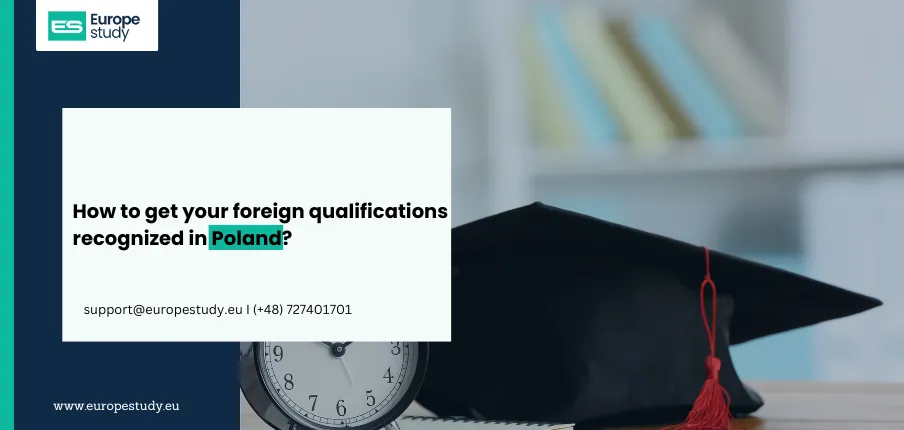
How to get your foreign qualifications recognized in Poland?
If you're planning to live, work, or study in Poland, one of the most important steps is getting your foreign qualifications officially recognized. Whether you hold a high school diploma, a university degree, or a professional certification, Poland has specific procedures for validating foreign educational and professional credentials. In this guide, we’ll walk you through the full process of recognition, who needs it, and where to begin.
Why Recognition Is Important
Recognition of foreign qualifications in Poland is necessary for:
- Accessing regulated professions (e.g., doctor, lawyer, engineer)
- Continuing education in Poland (e.g., applying for a Master’s program)
- Meeting employer requirements in certain sectors
- Obtaining work permits or residence permits that require proof of education
Types of Recognition in Poland
There are two main types of recognition:
1. Academic Recognition
Used when you want to continue your studies or need formal confirmation that your degree is equivalent to a Polish one.
2. Professional Recognition
Required if you're applying for jobs in regulated professions, such as medicine, law, teaching, architecture, or accounting.
Step-by-Step Guide to Getting Your Qualifications Recognized
Step 1: Determine What Type of Recognition You Need
Ask yourself:
- Are you applying for a regulated profession?
- Do you want to study in Poland?
- Do you just need your diploma verified for work?
Knowing the purpose helps determine whether to go through academic or professional channels.
Step 2: Prepare Required Documents
Generally, you will need:
- A legalized or apostilled diploma (depending on the country of issue)
- Official transcripts or a diploma supplement
- Proof of identity (e.g., passport)
- Certified translations into Polish (by a sworn translator)
- Proof of studies (duration, program content, grading scale)
Make sure your documents are complete and translated correctly. Missing or inaccurate documents can delay the process.
Step 3: Submit for Academic Recognition (If Applicable)
For academic recognition, contact the Polish National Agency for Academic Exchange (NAWA) or a Polish university with the right to grant doctoral degrees.
How to apply:
- Fill out the application form available on the NAWA website.
- Submit your documents either online or directly to the university handling your case.
- Pay the administrative fee (around 85–100 EUR, depending on the case).
Processing time: It usually takes 1 to 3 months, depending on the complexity of your case.
Website: https://nawa.gov.pl
Step 4: Submit for Professional Recognition (If Applicable)
If your profession is regulated, you’ll need to go through the Ministry or professional chamber responsible for that field.
Examples:
- Doctors, nurses, pharmacists: Ministry of Health
- Lawyers: Ministry of Justice
- Teachers: Ministry of Education
- Engineers/architects: Relevant professional associations
Each profession has its own standards and may require:
- Proof of professional experience
- Exams or adaptation periods
- Language proficiency (especially Polish)
Visit the Regulated Professions in Poland portal to find the authority relevant to your field.
Step 5: Wait for a Decision
Once submitted, the decision can take a few weeks to several months. In complex cases or where the educational system differs significantly from the Polish system, additional steps may be required, such as interviews or additional documentation.
Step 6: Appeal If Necessary
If your application is rejected or only partially recognized, you have the right to appeal. The appeal process varies depending on the authority, but you will usually need to submit additional documentation or clarify aspects of your education.
Additional Tips
- Use ENIC-NARIC: The ENIC-NARIC network helps compare academic qualifications internationally. You can use it to see how your qualification aligns with Polish standards: https://www.enic-naric.net
- Start Early: The process can take time, especially if your home country’s system differs significantly.
- Check for Bilateral Agreements: Some countries have agreements with Poland that simplify the process of diploma recognition.
Conclusion
Recognition of foreign qualifications in Poland is a necessary step for many international professionals and students. While the process may seem bureaucratic at times, careful preparation and understanding of the correct pathway will help you navigate it more efficiently. Whether you’re aiming to enroll in a Polish university, apply for a skilled job, or enter a regulated profession, ensuring your qualifications are recognized is key to success in Poland.
Need help with translating your documents or finding the right authority? Let us know in the comments, and we’ll point you in the right direction.





